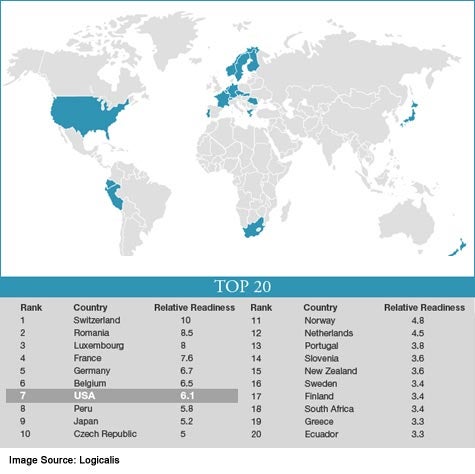The IPv6 drumbeat hasn’t quite reached the level of urgency required to keep the U.S. from falling behind other parts of the world in implementation, says a report from Logicalis US. Based on an analysis of Cisco data, one year after World IPv6 Day, the U.S. ranks seventh in readiness for the new IP address protocol.
“This is undoubtedly a concern for U.S. businesses. IPv6 might sound like a technology issue, but it’s much more than that. The United States has certainly not fallen too far behind yet, but failure to keep pace with other nations – trade partners or competitors – could ultimately have serious implications in terms of competitive capabilities for U.S. businesses,” said Mike Martin, senior vice president, Solutions and Services, at Logicalis US, in the release on the findings.
IPv6 Readiness, based on Cisco data
Logicalis points to a number of threats to growth within U.S. enterprises and the U.S. economy as a whole, perhaps most notably the fact that global business opportunities could be hampered if U.S. companies are seen as falling behind on this point.
Trends contributing to the mission-critical nature of adoption of IPv6 include the proliferation of mobile devices and their use for work purposes; M2M or the Internet of Things bringing appliances, vehicles and numerous other systems online; and the expanding intricacy of existing enterprise-grade systems. Even gaming is a large contributor to the need for IPv6 address expansion.
IT Business Edge’s Carl Weinschenk recently wrote that U.S. network providers, not surprisingly, seem to have gotten the IPv6 message, even if enterprise hasn’t quite yet.



